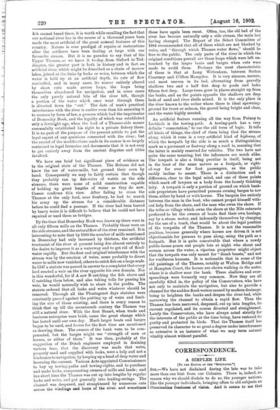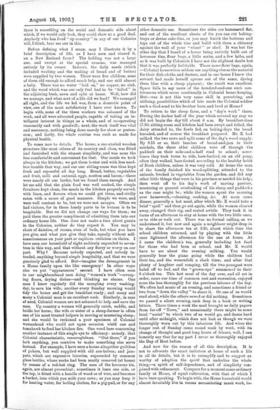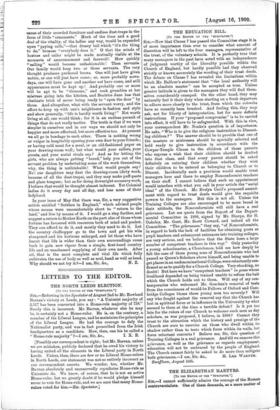CORRESPONDENCE.
A SIMPLER LIFE.
[To THE EDITOR or r " SPECTATOR:n
Srs„—We have not disdained during the late war to take more than one hint from our Colonies. There is, indeed, no reason why we should disdain to do so, the younger nations, like the younger individuals, bringing often to old subjects an illuminating freshness of vision. And it seems to me that there is something on the social and domestic side about which, if we would only look, they could show us a good deal. Anybody who has lived " up country " in any of our Colonies will, I think, bear me out in this.
Before defining what I mean, may I illustrate it by a brief description of life, as I have seen and shared it, on a New Zeslsnd farm ? The holding was not a large one, and except at the special seasons, was managed entirely by its owner. Indoors, the daily needs (which included washing and the making of bread and of butter) were supplied by two women. There were five children, none of them old enough to afford much help, and one still almost a baby. There was no water " laid on," no copper, no sink, and the wood which was our only fuel had to be "failed " in the adjoining bush, sawn and split at home. Well, how did we manage, and what sort of a life did we lead? We managed all right, and the life we led- was, from a domestic point of view, one of the most satisfactory I have ever known. To begin with, none of the three workers was ashamed of the work, and all were educated people, capable of taking an in- telligent interest in things as a whole, and of co-operating reasonably and with goodwill ; next, the work itself was vital and necessary, nothing being done merely for show or preten- sion ; and lastly, the whole routine was such as made for physical health.
To come now to details. The house, a one-storied wooden structure like most others of its country and class, was fitted and d furnished with the utmost simplicity, and was none the less comfortable and convenient for that. Our meals we took always in the kitchen; we got them hotter and with less need- less trouble that way, and our one sitting-room was thus kept fresh and reposeful all day long. Bread, butter, vegetables and fruit, milk and oatmeal, eggs, mutton and bacon,—these were nearly all our larder, but we found them enough. And let me add that the plain food was well cooked, the simple furniture kept clean, the meals in the kitchen properly served, with linen, and flowers when we could get them, and civilly eaten with a sauce of good manners. Simple we were, and were well content to be, but we were not savages. Often we had visitors, for in those lonely parts to be human is to be hospitable. But we did not change our ways for them; we paid them the greater compliment of admitting them into our ordinary home life. One does not make a fuss about guests in the Colonies, neither do they expect it. You may be short of dainties, of rooms, even of beds, but what you have you give, and what you give they take, equally without self- consciousness on your part or captious criticism on theirs. I have seen our household of eight suddenly expanded to seven- teen in this way, and that without any flurry or worry on our part. Why ? Because nobody expected, and nobody in- tended, anything beyond simple hospitality, and that we were genuinely glad to afford. But—imagine the derangement in a Home family upon the like emergency! In other ways also we put "appearances" second. I have often seen in our neighbourhood men doing " women's work "—sweep- ing floors, drying dishes—and thinking no shame. One man I knew regularly did the mangling every washing- day, to save his wife; another every Sunday morning would tidy the house and get the breakfast ready ; and many and many a Colonial man is an excellent cook. Similarly, in case of need, Colonial women are not ashamed to help and save the men. Up country a woman will generally catch, saddle, and bridle her horse; the wife or sister of a sheep-farmer is often one of his most trusted helpers in moving or mustering sheep; and she would be reckoned a poor specimen of Colonial womanhood who could not upon occasion wield axe and tomahawk to feed her kitchen fire. One word here concerning another instance of this single eye to efficiency : namely, that Colonial characteristic, resourcefulness. "Out there," if you lack anything, you contrive to make something else serve instead. For example, I have seen a house altogether guiltless of pokers, but well supplied.with old axe-helves; and jam- pate, which are expensive luxuries, superseded by common glass bottles, whose necks had been neatly removed (at home) by means of a red-hot ring. The uses of the kerosene tin, again, are almost proverbial ; sometimes it loses one side, or the top, is fitted with a handle of wood or of wire, and becomes a bucket, into which you.milk your cows ; or you may keep it for heating water, for boiling clothes, for a pig-pail, or for any
other domestic use. Sometimes the sides are hammered flat, and out of the resultant sheets of tin you can cut baking- trays or devise cake-tins, or you may knock the bottoms and tops out of the whole tins and build with them a chimney against the wall of your " whar6 " or shed. It was but the other day that I heard of a house being entirely built out of kerosene tine, flour bags, a little scrim, and a few laths, and as it was built by Colonials I have not the slightest doubt but that it was perfectly habitable. Those same flour bags, again, —Colonial housewives seldom use anything else as the material for their dish-cloths and dusters, and in one house I knew the servant had made herself aprons out of the same, dyeing them blue with a cheap pigment ; the result was excellent. Space fails to say more of the hundred-and-one such con- trivances which occur continually in Colonial house-keeping. But—was it not this very same skill in perceiving, and utilising, possibilities which of late made the Colonial soldier such a God-send to his brother born and bred at Home P To return to the sheep farm, and a " day's work " there. During the darker half of the year which covered my stay we did not begin the day till about 6 a.m. By breakfast-time (7.30) sitting-room and kitchen had been swept and tidied, the dairy attended to, the fowls fed, on baking-days the bread kneaded, and of course the breakfast prepared. Mr. X had milked the two cows and split some of the day's wood supply. By 8.15 or so, their lunches of bread-and-jam in their satchels, the three elder children were off through the paddock on their mile-and-a-half road to school ; some- times they took turns to ride, bare-backed, on an old pony, often they walked, bare-footed according to the healthy habit of Bush children, unless it was very cold. At home the man of the family finished his wood-splitting, attended to the animals, fetched in vegetables from the garden, and did any other little things that were in his province or needed his help ; then went off to his day's work of moving pasture, mustering or general overlooking of his sheep and paddock s as the case might be ; while the women spent the morning over housework,—cleaning, cooking, &c. At noon came dinner, generally a hot meal, after which Mr. X would take a brief " spell " and then go out again, while the women cleared away, changed their rig, and rested awhile. They took it in turns of an afternoon to stay at home with the two little ones, or to ride or walk out. There was no formal calling, as we understand it, but now and again a neighbour might drop in to share the afternoon tea at 3.30, about which time the school children returned, and by playing with the little ones lightened the afternoon for the one at home. At 5 came the children's tea, generally including hot food for those who had been at school, and Mr. X would have to see about the evening milking. You would generally hear the piano going while the children had their tea, and the womenfolk a slack time; and after that plenty of laughter and romping, till the two youngest were haled off to bed, and the " grown-ups" summoned to their 6 o'clock tea. This last meal of the day over, and all set in order, came our time of common rest and recreation, enjoyed none the less thoroughly for the previous labours of the day. We often had music of an evening, and sometimes a friend or two from " down the valley " to share it. Or one of us would read aloud, while the others sewed or did nothing. Sometimes we passed a silent evening, each deep in a book or writing letters. Three times a week the mail brought us daily papers from far-off "Town," and occasionally there might be some local "social" to which two of us would go, and dance hard until after midnight, which does not look as though we were thoroughly worn out by this laborious life. And when the longer rest of Sunday came round week by week, with its change of thought and good long hours of leisure, well, I can honestly say that for my part I never so thoroughly enjoyed the Day of Rest before.
And now for the reason of all this description. It is not to advocate the exact imitation at home of such a life in all its details, but it is to exemplify and to suggest as worthy of adoption the spirit that underlies the whole thing,—a spirit of self-dependence, and of simplicity con- joined with refinement. Compare for a moment some ordinary family at Home, of equal cultivation, with that of which I have been speaking. To begin with, the Home household would almost invariably live in rooms necessitating much work, be. cause of their crowded furniture and endless dust-traps in the form of little "ornaments." Much of the time and a good deal of the vitality, of the ladies any way, would be expended upon " paying calls,"—that dreary toil which " it's the thing to do," because " everybody does it." 0 that the minds of hostess and caller might be made mutually visible at the moments of announcement and farewell! How quickly " Galling " would become unfashionable ! Then servants. Our family would keep two or three servants. The very thought produces puckered brows. One will just have given notice, or one will just have come ; or, more probably nowa- days, one will have gone and another not have come, and still appearances must be kept up ! And probably one or more will be apt to be " tiresome," and cook grumbles at her mistress going into the kitchen, and Beatrice Jane has that obstinate trick of never being ready to " open the door " by three. And altogether, what with the servant worry, and the effort to keep up with one's neighbours in fashion and style and show generally, "life is hardly worth living!" Not worth living at all, one would think ; for it is an endless pursuit of things that do not really matter. The truth is that if we were simpler in ourselves and in our ways we should not only be happier and more effectual, but more effective too. At present we all go in bondage to each other. There is nothing wrong or vulgar in hospitably opening your own door to your friends ; or having cold meat for a meal, or an old-fashioned paper on your drawing-room wall ; but what would your callers, your guests, and your social rivals say ? And as for letting the girls, who are always getting " bored," help you out of the servant problem by undertaking some of the work themselves, why, the thing is unthinkable ! What would people say ? No! our daughters may dust the drawing-room (dirty work, because of all the dust-traps), and they may make puff-paste and glaze tongues ; but as for doing downright necessary work, I believe that would be thought almost indecent. Yet Colonial ladies do it every day and all day, and lose none of their ladyhood.
In your issue of May 31st there was, Sir, a very suggestive article entitled " Settlers in England," which advised people whose means were uncomfortably short to " return to the land," and live by means of it. I would go a step further, and suggest a return to Mother Earth on the part also of those whom fortune has favoured with resources both of mind and pocket. They can afford to do it, and mostly they need to do it. Let the country clodhopper go to the town and get his wits sharpened and his horizons enlarged, and let those who have learnt that life is wider than their own surroundings come back to gain new vigour from a simple, first-hand country life and an unashamed supplying of their own needs. After all, that is the most complete and vital life which fully cultivates the use of body as well as soul, hand as well as head.
Why should we not try it P—I am, Sir, &c., N. Z.




































 Previous page
Previous page